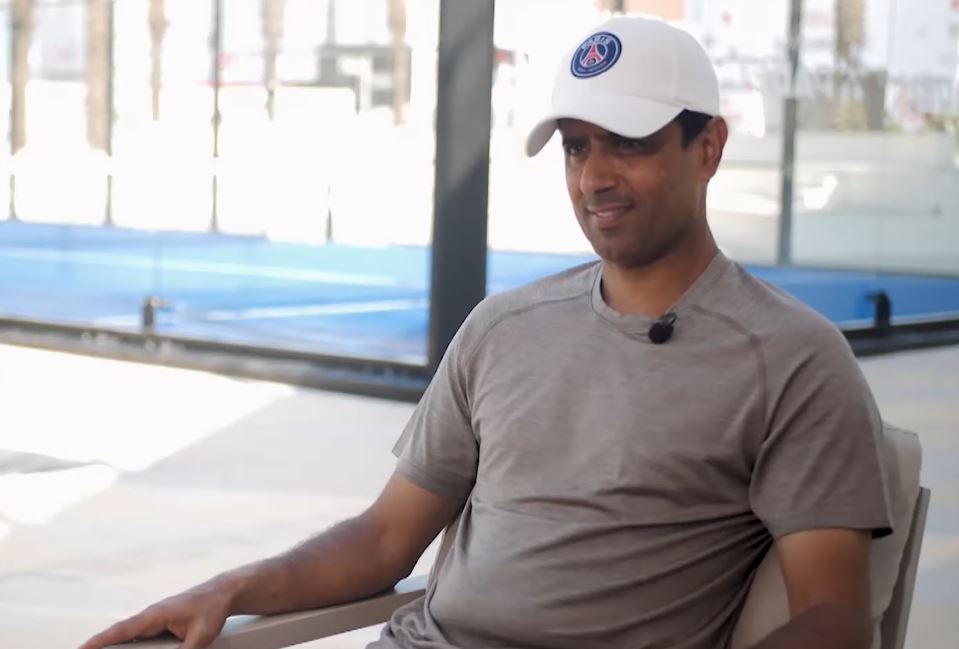
Nasser Al-Khelaifi’s estimated $9 billion fortune has been shaped by his strategic investments as well as his remarkably clear vision for using long-term influence to elevate media and sport. His rise has been purposeful and incredibly successful, from the executive suites of Europe’s most prestigious stadiums to the tennis courts of Doha. Al-Khelaifi was born into a modest family—his father was a pearl diver—and has painstakingly established a reputation based on performance, vision, and trust.
He went from being a mid-ranked tennis player to becoming a defining force in international sport over the last ten years. His career exemplifies the intersection of capital strategy, sporting diplomacy, and media rights as chairman of beIN Media Group, Qatar Sports Investments, and Paris Saint-Germain. His strategy has been especially creative, combining Qatar’s sporting identity with its economic objectives while largely avoiding the spotlight.
Nasser Al-Khelaifi – Net Worth, Power, and Influence
| Attribute | Detail |
|---|---|
| Full Name | Nasser bin Ghanim Al-Khelaifi |
| Birthdate | November 12, 1973 |
| Nationality | Qatari |
| Education | Economics (Qatar University), Master’s (University of Piraeus) |
| Height | Approx. 1.80 meters |
| Former Career | Professional Tennis Player |
| Current Roles | Chairman of beIN Media Group, QSI, PSG President, ECA Chairman |
| Estimated Net Worth | $8 to $9 Billion (as of 2025) |
| Spouse | Ghada R. Al-Khelaifi |
| Reference | www.wikipedia.org/wiki/Nasser_Al-Khelaifi |
Al-Khelaifi became the club president after Paris Saint-Germain was purchased by QSI in 2011. PSG was a popular French team at the time, but it had little real influence in Europe. That story changed almost immediately. By carefully bringing in elite players like Kylian Mbappé, Neymar, Lionel Messi, and Zlatan Ibrahimović, PSG not only became competitive but also established itself as a standard. Every signing served as a marketing genius, drawing attention from all over the world and enhancing the brand.
The consistency of vision, not just the amount of money spent, was what gave these actions their particular impact. Al-Khelaifi’s strategies have significantly raised PSG’s market value, worldwide merchandise sales, and prospects for long-term sponsorship. His choices, which are frequently audacious but never careless, reveal a highly effective business approach based on long-term profits rather than ephemeral media cycles.
Al-Khelaifi is in charge of a global broadcasting empire that spans more than 40 countries through beIN Media Group. BeIN has established itself as the main source of sports content in the Middle East and beyond by utilizing its exclusive rights to major football leagues like the Champions League and La Liga. This diversification is especially helpful for creating sustainable growth across various industries and protecting revenue streams.
He continues to lead with a quiet firmness. His private life with wife Ghada is purposefully kept out of the spotlight, and he rarely displays flamboyance in interviews. This discretion is a preventative measure, not an accident. Keeping a low profile is a very dependable tactic for someone whose name is associated with billion-dollar contracts, court cases, and political balancing acts.
The impact of Al-Khelaifi goes well beyond club administration. He is a key figure in guiding decisions that impact continental governance and UEFA competitions as chairman of the European Club Association. He has gained the trust of even those who initially regarded Qatar’s sporting aspirations with suspicion by positioning himself as a mediator between national federations, broadcasters, and commercial stakeholders through strategic partnerships.
The majority of his estimated $8–9 billion net worth comes from his strategic equity holdings, leadership positions, and regular performance bonuses linked to organizational expansion. Even though this sum puts him among the richest sports executives in the world, his impact is perhaps more significant than the sum of his money. It’s not just how much he owns; it’s also how well he manages the creation of value in the media and sports industries.
Due to PSG’s steady trophy wins and deep runs in the Champions League, which have increased the club’s sponsorship base and generated commercial gains, his net worth has significantly increased in recent years. Additionally, beIN Media Group keeps growing into digital production and broadcasting, indicating more expansion in the sports and entertainment sectors.
Even when questioned, as was the case with the 2017 Swiss probe into media rights talks, Al-Khelaifi has remained calm and unflappable. Legal challenges haven’t done much to alter his overall trajectory, though they might momentarily slow things down. His capacity to endure criticism and hold onto high-level positions suggests a leadership style that is especially resilient in stressful situations.
Al-Khelaifi functions differently than football owners such as Sheikh Mansour, Roman Abramovich, or the Agnelli family. He doesn’t only rely on investments backed by oil or legacy wealth. Rather, he has developed a strategic framework centered on strategic acquisitions and media leverage. Given its wide-ranging effects, this model has shown itself to be remarkably robust and operationally inexpensive in the context of contemporary football economics.
Al-Khelaifi’s structure enables PSG to exercise both creativity and control, while other clubs struggle between investor demands and financial fair play regulations. Streamlining contracts, keeping talent, and maximizing brand equity without becoming susceptible to transient swings are all aspects of his operations that have been planned with sustainability in mind.
Among young sports entrepreneurs, Al-Khelaifi has also sparked a generational shift. His story provides a model for individuals who want to lead across multiple verticals because of his early athletic discipline, business education, and ability to integrate across complex ecosystems. He has architected success rather than merely managed it.
Al-Khelaifi’s financial situation is anticipated to improve gradually as PSG anticipates upcoming Champions League campaigns and beIN keeps expanding its online presence. His profile will probably grow even more in the upcoming years as Qatar fortifies its international sports portfolio. His ability to simultaneously shape narrative and revenue, whether through broadcast negotiations, tennis, or football, is extremely uncommon and guarantees his place at the table for many years to come.
